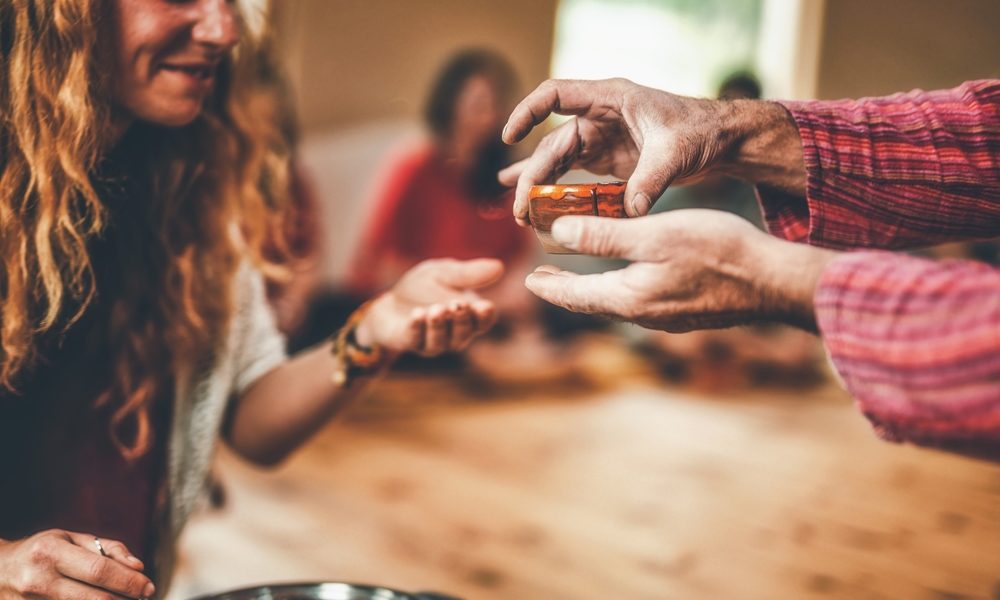Many automatically associate psychedelics with spirituality, as both have historically been, and continued to be, used for purposes surrounding prolonged wellness, overcoming trauma and other religious and spiritual purposes.
As the conversation of psychedelic medicine continues to inch its way into the mainstream, hundreds of churches have gained prominence for using psychedelic substances as part of their religious practices.
While psilocybin is at the forefront of psychedelic research today, with scientists uncovering its potential benefits in treating otherwise untreatable mental health conditions, these psychedelic churches are also beginning to embrace ayahuasca as part of their practices.
Ayahuasca is a concentrated liquid made from prolonged heating or boiling of Banisteriopsis caapi vine and the leaves of the Psychotria viridis plant. It creates a tea containing DMT, the psychedelic element of the brew. Indigenous communities have historically used the plant for spiritual and religious purposes, and today, shamans or spiritual leaders will often prepare the brew and lead ceremonies, helping folks to gain a new perspective, confront trauma or seek long-term, life-altering changes, among other reasons.
Advocates say the use is protected by a 2006 Supreme Court ruling. In the case, a New Mexico branch of a Brazilian-based ayahuasca church was allowed to use ayahuasca as a sacrament, but since the brew contains DMT, it is still illegal under U.S. federal law.
It’s also become more commonplace over time for Americans to spend thousands of dollars to take ayahuasca at Amazonian retreats, though the underground movement in the U.S. is growing.
The Associated Press recently caught up with a number of churches that use ayahuasca as part of their practice, saying that the plant brings people closer to spiritual enlightenment and to God that traditional religious services, along with assisting with other physical and mental afflictions.
Sean McAllister represents an Arizona church in a lawsuit against the federal government after its ayahuasca from Peru was seized at the port of Los Angeles. Similar actions have caused other churches to cease operations, fearing prosecution, though McAllister told AP that these psychedelic, religious practices are more common than one might think.
“In every major city in the United States, every weekend, there’s multiple ayahuasca ceremonies. It’s not just a twice-a-year thing,” he said.
One ceremony outlined by AP involved a variety of participants, from military veterans, corporate executives, ex-members of a polygamous Mormon sect, and more, often mirroring more traditional, shaman-led experiences.
One of these new religious, ayahuasca groups is Hummingbird, which has no written text and primarily relies on the prayers, chants and songs of Taita Pedro Davila, a Colombian shaman and healer who oversees ceremonies. Hummingbird Founder Courtney Close said that ayahuasca helped her overcome a cocaine addiction and postpartum depression. She participated in about 200 ceremonies and had a vision to start the church at one of them.
“We just try to create a spiritual experience without any dogma and just let people experience God for themselves,” Close said.
She also cautioned against ceremonies with inexperienced users focused on making money. Hummingbird has brought doctors, nurses and CPR-trained staff to ceremonies and encourages participants to stop taking certain medications before their experiences. The church has also created an intake process to avoid taking in those most at risk, with severe mental illnesses or heart conditions for example. There is also a no-touching policy during ceremonies.
Close also said she is worried about a crackdown from the U.S. government, citing the presumption that psychedelic churches are creating a public health crisis.
And that fear isn’t without merit.
California-based Zide Door Church distributes cannabis and psychedelic drugs for sacramental purposes and alleged that a 2020 police raid violated federal protections for religious freedom. The raid resulted in the seizure of approximately $200,00 in cannabis, mushrooms and cash, with police claiming the establishment was operating as an unlicensed dispensary, not as a church. The church proceeded to file a lawsuit against the City of Oakland and its police department in 2022, arguing that the raid and seizure violates constitutional guarantees of religious freedom and detailing the “sacramental use” of these plant medicines.
Last year, Rabbi Ben Gorelick, founder of The Sacred Tribe in Denver that uses psilocybin for spiritual enlightenment, also made headlines for his arrest and charge with possession with intent to manufacture or distribute a controlled substance, a first-degree felony. After Colorado voted to legalize the use of psilocybin and other psychedelic drugs in November, the Denver district attorney’s office dropped the felony charges.
These instances are not uncommon, as a number of other U.S. churches embracing psychedelics for spiritual purposes have similarly fought against federal courts for their right to use psychoactive plant medicines as part of their spiritual practices.
Research on DMT and mental health is more limited than similar research on psilocybin, though a recent Phase IIa clinical trial found a “significant and clinically relevant reduction in depression symptoms” two weeks after DMT dosing, compared to a placebo group.

